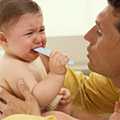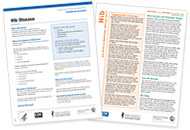Haemophilus influenzae is a type of bacteria that mainly causes illness in babies and young children. These bacteria can cause infections in people of all ages ranging from mild, such as an ear infection, to severe, such as a bloodstream infection. In spite of the name, H. influenzae do not cause influenza (the “flu”). There are six identifiable types of H. influenzae bacteria (a through f) and other non-identifiable types (called nontypeable). The one people are most familiar with is H. influenzae type b, or Hib, that can be prevented with a vaccine. However, the vaccine does not protect against other types of the bacteria.
Related Links
Is Your Child Protected against Hib Disease?

Hib can cause severe diseases, including meningitis, but Hib disease is vaccine-preventable. Your child should get the full series of Hib shots as a baby, as well as one booster shot when they are 12 through 15 months old.
How it Spreads

H. influenzae, including Hib, are spread person-to-person by direct contact or through respiratory droplets that are created when people cough or sneeze.
Hib Information Sheets

- Basic fact sheet about Hib disease and vaccine.
- In-depth fact sheet [2 pages] about Hib disease and vaccine, including a personal story.
- Page last reviewed: July 25, 2016
- Page last updated: July 25, 2016
- Content source:


 ShareCompartir
ShareCompartir